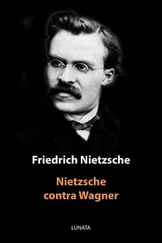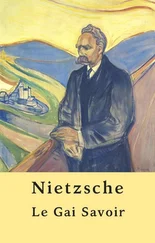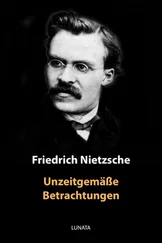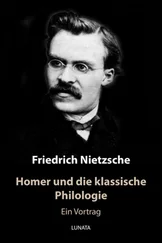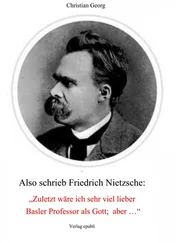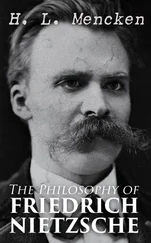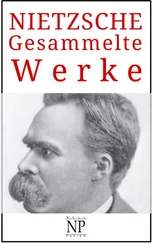This was the case, for example, when Buddha appeared among a people that was both peaceable and afflicted with great intellectual weariness.
This was also the case in regard to the first Christian community (as also the Jewish), the primary condition of which was the absolutely unpolitical Jewish society. Christianity could grow only upon the soil of Judaism—that is to say, among a people that had already renounced the political life, and which led a sort of parasitic existence within the Roman sphere of government, Christianity goes a step farther : it allows men to "emasculate" themselves even more; the circumstances actually favour their doing so.— Nature is expelled from morality when it is said, "Love ye your enemies": for Nature's injunction, "Ye shall love your neighbour and hate your enemy," has now become senseless in the law (in instinct); now, even the love a man feels for his neighbour must first be based upon something ( a sort of love of God ). God is introduced everywhere, and utility is withdrawn; the natural origin of morality is denied everywhere: the veneration of Nature, which lies in acknowledging a natural morality, is destroyed to the roots....
Whence comes the seductive charm of this emasculate ideal of man? Why are we not disgusted by it, just as we are disgusted at the thought of a eunuch?... The answer is obvious: it is not the voice of the eunuch that revolts us, despite the cruel mutilation of which it is the result; for, as a matter of fact, it has grown sweeter.... And owing to the very fact that the "male organ" has been amputated from virtue, its voice now has a feminine ring, which, formerly, was not to be discerned.
On the other hand, we have only to think of the terrible hardness, dangers, and accidents to which a life of manly virtues leads—the life of a Corsican, even at the present day, or that of a heathen Arab (which resembles the Corsican's life even to the smallest detail: the Arab's songs might have been written by Corsicans)—in order to perceive how the most robust type of man was fascinated and moved by the voluptuous ring of this "goodness" and "purity." ... A pastoral melody ... an idyll ... the "good man": such things have most effect in ages when tragedy is abroad.
***
With this, we have realised to what extent the "idealist" (the ideal eunuch) also proceeds from a definite reality and is not merely a visionary.... He has perceived precisely that, for his kind of reality, a brutal injunction of the sort which prohibits certain actions has no sense (because the instinct which would urge him to these actions is weakened, thanks to a long need of practice, and of compulsion to practise). The castrator formulates a host of new self-preservative measures for a perfectly definite species of men: in this sense he is a realist. The means to which he has recourse for establishing his legislation, are the same as those of ancient legislators: he appeals to all authorities, to "God," and he exploits the notions "guilt and punishment"—that is to say, he avails himself of the whole of the older ideal, but interprets it differently; for instance: punishment is given a place in the inner self (it is called the pang of conscience).
In practice this kind of man meets with his end the moment the exceptional conditions favouring his existence cease to prevail—a sort of insular happiness, like that of Tahiti, and of the little Jews in the Roman provinces. Their only natural foe is the soil from which they spring: they must wage war against that, and once more give their offensive and defensive passions rope in order to be equal to it: their opponents are the adherents of the old ideal (this kind of hostility is shown on a grand scale by Paul in relation to Judaism, and by Luther in relation to the priestly ascetic ideal). The mildest form of this antagonism is certainly that of the first Buddhists; perhaps nothing has given rise to so much work, as the enfeeblement and discouragement of the feeling of antagonism. The struggle against resentment almost seems the Buddhist's first duty; thus only is his peace of soul secured. To isolate oneself without bitterness, this presupposes the existence of a surprisingly mild and sweet order of men,—saints....
***
The Astuteness of moral castration. —How is war waged against the virile passions and valuations? No violent physical means are available; the war must therefore be one of ruses, spells, and lies—in short, a "spiritual war."
First recipe: One appropriates virtue in general, and makes it the main feature of one's ideal; the older ideal is denied and declared to be the reverse of all ideals. Slander has to be carried to a fine art for this purpose.
Second recipe: A type of man is set up as a general standard ; and this is projected into all things, behind all things, and behind the destiny of all things—as God.
Third recipe: The opponents of one's ideal are declared to be the opponents of God; one arrogates to oneself a right to great pathos, to power, and a right to curse and to bless.
Fourth recipe: All suffering, all gruesome, terrible, and fatal things are declared to be the results of opposition to ones ideal—all suffering is punishment even in the case of one's adherents (except it be a trial, etc.).
Fifth recipe: One goes so far as to regard Nature as the reverse of one's ideal, and the lengthy sojourn amid natural conditions is considered a great trial of patience—a sort of martyrdom; one studies contempt, both in one's attitudes and one's looks towards all "natural things."
Sixth recipe: The triumph of anti-naturalism and ideal castration, the triumph of the world of the pure, good, sinless, and blessed, is projected into the future as the consummation, the finale, the great hope, and the "Coming of the Kingdom of God."
I hope that one may still be allowed to laugh at this artificial hoisting up of a small species of man to the position of an absolute standard of all things?
205.
What I do not at all like in Jesus of Nazareth and His Apostle Paul, is that they stuffed so much into the heads of paltry people, as if their modest virtues were worth so much ado. We have had to pay dearly for it all; for they brought the most valuable qualities of both virtue and man into ill repute; they set the guilty conscience and the self-respect of noble souls at loggerheads, and they led the braver, more magnanimous, more daring, and more excessive tendencies of strong souls astray—even to self-destruction.
206.
In the New Testament, and especially in the Gospels, I discern absolutely no sign of a " Divine " voice: but rather an indirect form of the most subterranean fury, both in slander and destructiveness—one of the most dishonest forms of hatred. It lacks all knowledge of the qualities of a higher nature. It makes an impudent abuse of all kinds of plausibilities, and the whole stock of proverbs is used up and foisted upon one in its pages. Was it necessary to make a God come in order to appeal to those publicans and to say to them, etc. etc.?
Nothing could be more vulgar than this struggle with the Pharisees, carried on with a host of absurd and unpractical moral pretences; the mob, of course, has always been entertained by such feats. Fancy the reproach of "hypocrisy!" coming from those lips! Nothing could be more vulgar than this treatment of one's opponents—a most insidious sign of nobility or its reverse....
207.
Primitive Christianity is the abolition of the State : it prohibits oaths, military service, courts of justice, self-defence or the defence of a community, and denies the difference between fellow-countrymen and strangers, as also the order of castes.
Читать дальше



